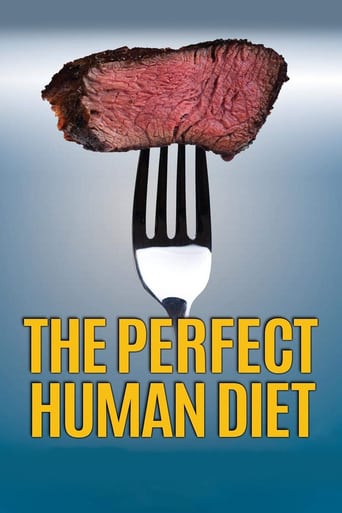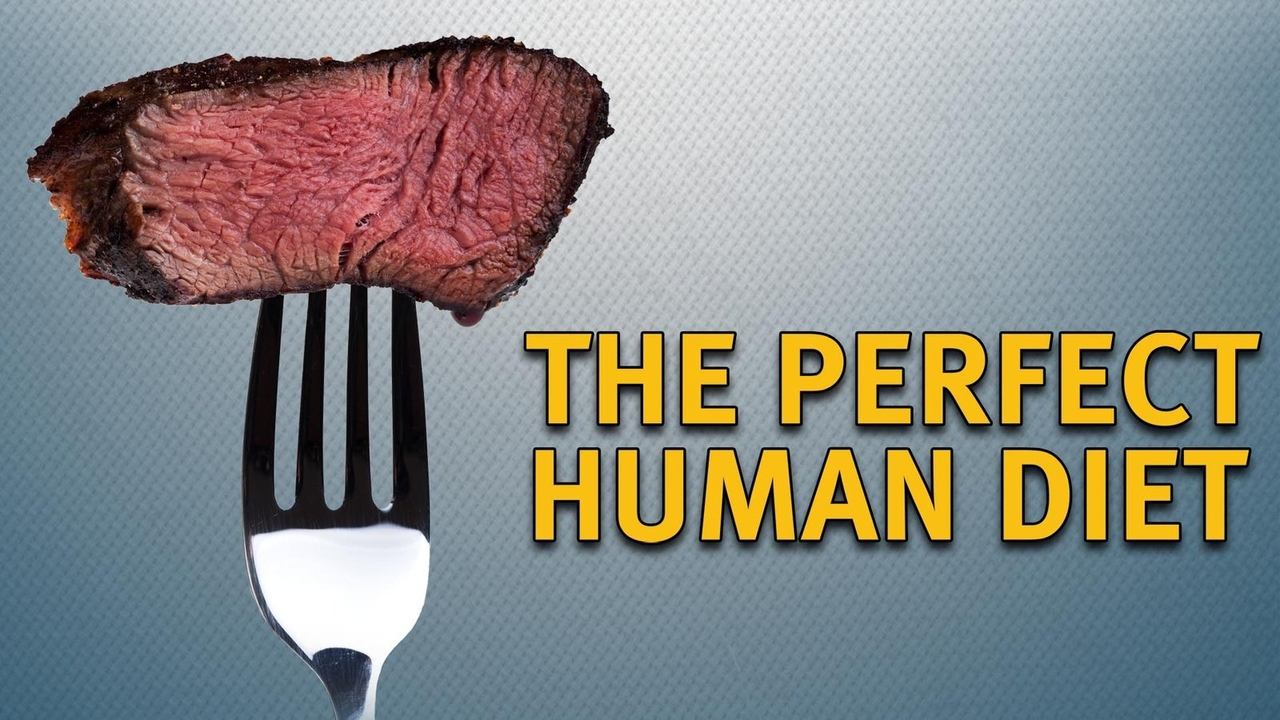jbradfordinc
Watched this documentary yesterday. It was very interesting from the perspective of evolutionary origins of the human diet, and somewhat accurate from that respect I believe as well. However, it's clear anti-vegetarian/anti-vegan bias made it less than desirable as a movie to recommend. It makes several poor assumptions about what it means for us in a modern society based on our ancestors' diets. And it glosses over a many of the modern arguments for vegetarianism and veganism that are very powerful.This documentary also continues to harp on the idea that the consumption of meat is responsible for our ancestors developing large brains. While this may have been a factor, it completely ignores the fact that most evolutionary biologists believe that it was the advent of cooking that is largely responsible for our increased brain capacity, not the consumption of meat. (No other carnivore/omnivore developed large brains, only us.) It is much more likely that our bodies incorporated certain animal-based nutrients, like vitamin B12, as our brains enlarged, rather than being the cause of our enlarged brains.But, it should be noted that veganism and vegetarianism are not diets for optimal human health in and of themselves. You can absolutely be a fat, unhealthy vegan if you want to. Veganism is largely based in the ethical and environmental arguments, taking into account the almost irreparable damage that our modern agricultural industry is doing to the planet. To be vegan AND healthy, you must also consider what our ancestors consumed and make sure you are getting adequate plant protein from diverse sources, nutrients, etc.Both "Food Choices," which I highly recommend, and this documentary overlap in certain areas, which are that the consumption of highly refined, processed food products (like HFCS) are bad for human health in general. They both agree that humans are the most healthy when we consume whole food products with fewer additives. They also agree that milk products in general are not good for human health beyond a very young age.
gypsytwilight
So the message behind the film seemed to be eat more meat. Here are just a few problems I saw with the arguments the film use's to make that claim.1. Person claims humans have a herbivores digestive system. Obviously untrue (we are omnivores as are our closest relatives) but I'm not sure why he chose to feature a business owner selling soy jerky to make it other than it discredits people who support vegetarianism. Would have been better to either not addressed vegetarianism at all, or had some sort of expert to explain the relative upsides/downsides of a vegetarian diet. For example of the 4 of the 5 blue zones in the world have a plant based diet and the 5th is mostly fish.2. Person claims that all herbivores have four stomachs. This is factually not true. Horses, Rhino's, rabbits, and a host of other herbivores have a single stomach.3. If you have read In Defense of Food you know how complicated nutritional science is. The film implies that the old low fat movement came about with no scientific backing. To me that sounds more like an infomercial than a documentary. It's quite possible whatever evidence they were gathering was either misleading or misinterpreted but it would have been more illuminating to discuss what the specific errors were and why the modern science is better. Is the view the film is pushing the result of increases in knowledge or just the next fad. Personally I'm not sure and looking at this film critically doesn't go a long way towards convincing me.3. Person claims that there high carb proponents make no differentiation between processed an non-processed carbs after a scene at the vegetarian summit where a presenter specifically said avoid processed foods. This is sort of the base problem with the films premise. Humans have evolved to thrive on a pretty wide range of foods and whole grains are not that different from the foods we were eating previously. The problem is that in refining them we remove all but the least nutritionally dense portion of the grain and turn that nutritionally deficient substance into a large portion of or diet. That is far different from having a moderate amount of whole grains and a greatly increased level of more nutritionally dense vegetables which is the diet vegetarians actually promote. Again maybe paleo are right but you need to make a fair comparison to know one way or the other.4. The analysis by the plank institute only covers Europe, an area that earlier in the film noted has no plant food sources for a significant period of the year. Humans are opportunistic eaters they will eat what is available. If plants are not available they won't be a large portion of the diet. If you look at what we know about diets world wide the only thing they have in common is variety.5. When you make a film that is promoting establishment views you don't need to give outsiders a voice. The opposite is not true. At some point it would have been a good idea to have some sort of expert on to explain why the current recommendations exist and to weigh in on the benefits and disadvantages of the diet the movie.I think paleo is an overall fairly healthy diet. I think this film would have made a better case for it by focusing on modern studies showing it's benefits than focusing on one side of the debate over what our ancestors ate. It also seemed to miss that all the nutrients animals are getting come from the food they eat so if you're eating grain fed beef you're not making a huge improvement over eating the grains yourself.
keith-tully64
Excellent documentary of an idea that seems so simple yet profound: when determining what we should consume, look to how we as humans have lived for the vast majority of the past 2 million years. When viewed through that context, the ideas of eating highly processed foods, eating only vegetables or eating large amounts of grain are the untested and somewhat radical approaches. Yet those diets are what we either consume or are told to consume. I wish the documentary would have explained in more detail that they recommend removing grains and sugars but replacing them with healthy fats. I thought the Primal Diet was about eating more protein but they seam to say that we should replace the sugar and grain calories with more fats including animal fats for optimal health. But otherwise, fast paced for a documentary, well presented information that should be eye-opening to all.
Tyler Fenby
The movie itself is excellent. It points out the problems in our modern diets, and gives a method of being healthy that has been nothing short of a miracle for me and my family.To address some issues others have had:It is true that life was hard during earlier times, meaning that only those that could survive in such harsh conditions could survive. This shaped us, but says nothing of our lifestyles today. If anything, this could help explain why intermittent fasting is so beneficial.Many insects/bugs are anything but unhealthy. You can think they're disgusting as an effect of the culture of your upbringing, sure, but to claim they're all unhealthy is just untrue.You can't conflate diet with hygiene. I don't counter vegetarians with "if all you want to do is eat plants in small meals, why don't you just take off all your clothes, ruminate, and forget about toilets?"If you don't think hunting, gathering, walking everywhere, crafting, and everything else that comes along with living as our ancestors did constitutes exercise, I can't imagine what would. Take a look at the physical fitness of modern H/G tribes and tell me they don't exercise.Humans are the most versatile species ever. We live and have lived everywhere from below sea level to the tops of mountains, from desert to jungle, eating every plant or animal that didn't kill us. To claim that a majority of humans throughout our evolution were primarily fishers is nonsense. At the very least, humans have been hunting for two _million_ years. More than enough to help shape us.Look at native populations all over the world. The Anbarra, Arnhem, Ache, Nukak, Hiwi, !Kung, and Hazda tribes. All eating the historical diets of their people, and all in good enough shape to live many long years in incredibly difficult environments."Many long years?", you say? "But I thought they only lived to 40!" You might want to read the paper "Longevity Among Hunter-Gatherers: A Cross- Cultural Examination." Hunter/Gatherers live to be 80. Want to know something even better? Many H/Gs get 70-80% of their calories from meat, and they have no atherosclerosis (per other papers by Kaplan, et al.).As for grains, while the heritage strains of wheat that we have been farming for the last 10k years might be fine, the fact is that the wheat we eat today is nothing even close. It should be considered an entirely new food type. Not to say that humans haven't found a new food and thrived on it before, of course, just that pointing out how long we've been eating it is irrelevant when it's been completely overhauled.In summary, the movie does an excellent job pointing out the problems of a modern diet, and offers an alternative that has proved to be hugely beneficial to those that try it. Humans function best when we eat what humans have eaten throughout our entire evolution: real food. Given our long evolutionary history of eating everything with a pulse, that should definitely include animals--meat, offal, marrow and all.


 AD
AD


